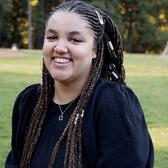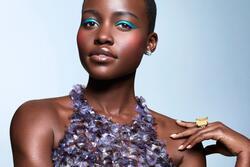I’m a Black Jewish Woman and I’m Tired of Being Called “Angry”
This is the second in a series of pieces to mark Black History Month. Check out the first piece in the series and look for more essays throughout the month of February!
Being Black and Jewish and a woman means living in a world that has tried to destroy every community I belong to. My ancestries hold the stories of Jim Crow segregation, the transatlantic slave trade, Eastern European pogroms (anti-Jewish riots) and subsequent attempts to find refuge in America. I have always known the atrocities that plagued my ancestors.
Growing up, I proudly identified with the term “woke” as it was originally used in the Black American community, before it was co-opted and misrepresented by the media. To Black people, being “woke” means being constantly aware of the ways society will try to undermine our humanity. It means to be awake, vigilant, conscious of our position in America and of the systemic and institutional efforts to maintain the remnants of chattel slavery and racial degradation.
As a Black Jewish woman, I have always been dedicated to learning and telling the stories of my people’s histories, legacies, struggles, and triumphs. I was the girl who spoke in school about Black liberation leaders, from Dr. Martin Luther King Jr to Malcolm X. I read books about life for Eastern European Jews and heard about the daring escape my family made from Russia.
Unfortunately, being outspoken as a Jew, a Black person, and a woman has come at a cost. I am often called “angry” and “irrational” simply for telling the truth, for having the audacity to be forthright rather than submissive, as I’m expected to be.
Historically, the tropes for Black American women have been limited to a few roles: Since the early 20th century, the portrayal of Black women in media has ranged from Mammy in 1935’s Gone with the Wind to Clare Kendy as the tragic mulatto in Nella Larsen’s Passing, to music videos of Black women scantily clad for the benefit of a male singer. One thing society cannot stand, however, is a Black woman who speaks her mind unapologetically. From Rosa Parks to Stacey Abrams, an outspoken Black woman is too powerful for people to handle.
Jewish women are also often portrayed as stereotypes. In TV shows, movies, and books, Ashkenazi Jewish women (especially mothers) are depicted as neurotic, overbearing, overly talkative, and often unreasonably angry. Examples include Rachel Bloom from Crazy Ex-Girlfriend and Molly Goldberg from The Goldbergs. I have often resented being labeled “angry” or “too much” because of my unapologetic assertion of my Jewish pride.
Some might argue that these stereotypes possess layers of truth. There are women who are Black and/or Jewish and proudly claim the attributes of being extroverted, bubbly, or energetic. Through poetry and building community, I enjoy embracing my “loud” or outspoken personality that has allowed me to connect with others in the world. All I ask for is nuance and respect. I ask that these attributes are not demonized or applied to my communities in order to portray us in the worst possible light. For some Black and Jewish women, our vibrant and forthright energy can be a way to express ourselves and to cope with the difficulties of life. Being “too much” or “too outspoken” have often been the only ways for us to be heard, to advocate for ourselves in the face of anti-Black racism, antisemitism, and sexism.
As a spoken word poet, I’ve written about how people take me less seriously because of my outspokenness. In one poem, I wrote: “I have the right to claim this golden rage that has kept me alive.” I am an observant Jew who dresses modestly, sports an enormous afro, is Black, and has built a social media presence around the intersections of my identities. I am rightfully angry when I am called “Shaniqua” in the comments, when I am ridiculed for my love of Israel, or when I proudly proclaim the two identities targeted most by white supremacists and other extremists.
When I am tired, I pray with tears in my eyes, and seek comfort in Torah and family stories. I sit in community with those who make me feel safe or listen to music that helps me feel less alone. I have given myself the challenge of not letting my anger, my disappointment in the world, or my outspokenness consume me. Often, women take on the burdens of nurturing, protecting, and uplifting our people. I want to hold space for all of the emotions I am feeling when confronted with anti-Black racism and antisemitism, but I do not want these feelings to come at the expense of my wellbeing. I want to use my social media platform and my writing to educate people about Torah, historical trauma, assimilation, Black and Jewish traditions, and combating hatred, without draining myself and being labeled as “too much.”
I have the right to be upset with the state of the world and with the way people conflate Jewish womanhood and Black womanhood with unwarranted anger and irrationality. I don't want people to simply label me as unreasonably upset and pretend that is all I am. I can be modest and passionate about defending my communities. I can be rooted in Torah and learn about healing based on communal liberation from women like bell hooks and Audre Lorde. I refuse to choose between being a “good woman” or a woman who will not be intimidated, belittled, or silenced. I am woman enough because I say I am. I am woman enough because being nurturing also means sticking up for those I care about.
If I am just another angry Black and Jewish woman, then maybe we can all work to make this world safe enough so that I do not have to be.






Just read your story on Facebook and it’s fascinating .
I am program chairman of a Jewish heritage group in Boynton beach Florida . I would be proud to hear you speak on being Black and Jewish .I have no idea where you live but perhaps it’s not to far from us
Best regards